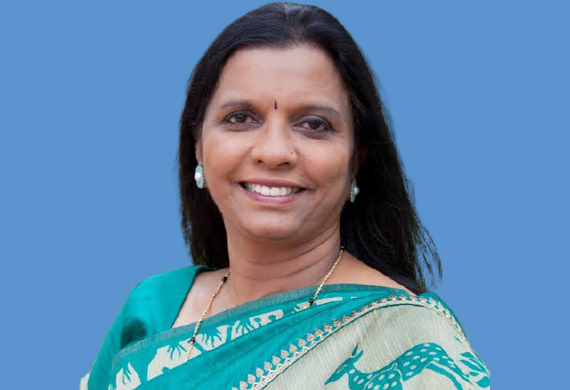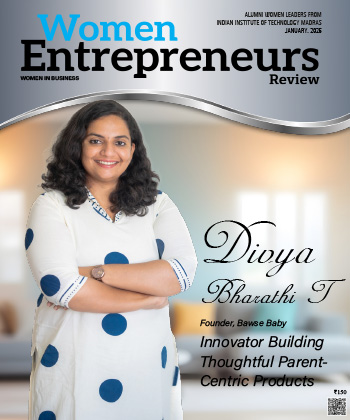
Woman-led Start-up NIRAMAI Honoured with Global Women's Health Tech Awards
By: WE Staff | Thursday, 13 January 2022
NIRAMAI Health Analytix Pvt. Ltd., a woman-owned incubator, has awarded The World Bank Group and the Consumer Technology Association's Global Women's Health Tech Awards, which recognise innovative start-ups that utilise technology to advance women's health and safety in developing nations. The Department of Biotechnology's Biotechnology Industry Research Assistance Council (DBT-BIRAC) is supporting the firm.
According to the World Bank, this year's prizes featured more than 70 businesses from 35 countries that presented innovative solutions in three categories: general women's and adolescent health, reproductive health and pregnancy, and women's safety and security.
The BIRAC Women in Entrepreneurial Research Award 2019 was given to NIRAMAI Health Analytix Pvt. Ltd for its innovative software-based medical device that detects early-stage breast cancer and breast densities in women of all ages in a simple and private manner, addressing a critical unmet need in cancer screening.
Dr. Geeta Manjunath, the company's founder, founded NIRAMAI to develop a groundbreaking AI solution for identifying early stage breast cancer in a non-invasive, radiation-free method.
Thermalytix, a computer diagnostic engine based on machine learning and artificial intelligence, uses artificial intelligence algorithms to analyse thermal images and generate a statistical report for breast health and abnormalities.
Dr. Manjunath said, “we are pleased to receive this recognition from the World Bank. It's a validation of the applicability of our Indian innovation to the world.”
The startup's partnerships with more than 30 hospitals and diagnostic centres throughout India have resulted in the testing of over 45,000 women.
The Ministry of Science and Technology said, “the product can help two billion women in the world to regularly screen for cancer and can potentially save 90,000 lives every year in India alone.”
Most Viewed
- 1 Women's Health Startup HerMD Closing Doors Amid Industry Challenges
- 2 5 Famous Women in Indian Armed Forces
- 3 Saudi Women No longer Require Male Permission for Clothing Choices, says Prince MbS
- 4 Kolkata Medtech Startup Innovodigm Raises Rs 5.5 Crore Seed Funding Led by IAN Group
- 5 Yamunanagar's Kashish Kalra Honoured after Securing 111th Rank in UPSC Civil Services Exam
- 6 Madurai Appoints Its First Woman Corporation Head
- 7 IAS Vijayalakshmi Bidari Appointed as the new Nagpur Divisional Commissioner
- 8 American Entrepreneur Lucy Guo Overtakes T Swift to become Youngest Female Billionaire
- 9 ICC Women's World Cup 2025 Trophy Showcased at Indore's Holkar Stadium
- 10 Aparna Saxena's Beauty Venture AntiNorm Launches in India
- 11 Vidya Nataraj Co-Founded BlueStone Jewellery & Lifestyle files IPO
- 12 5 Women Freedom Fighters of India
- 13 Dr. G Krishnapriya appointed as CEO for Trichy
- 14 M3M & Sirona Partner to Introduce Menstrual Hygiene Vending Machines in 15 Locations
- 15 Punjab Govt launches SHE Cohort 3.0 Supporting Tech-led Women Startups
- 16 Indian origin Lawyer, Sweena Pannu appointed as the US New Superior Court Judge
- 17 The Aurora Tech Award recognizes 4 Indian Women-led Startups
- 18 Kerala's Republic Day parade featured an all-female tableau
- 19 Manisha Kabbur Becomes Karnataka's First Woman International Karate Coach
- 20 Director K. S. Ravikumar's Daughter Maalica Ravikumar Launches Life Coaching Company 'Evergrowth Academy' for Women
- 21 Leezu's Raises Pre-Seed Funding to Accelerate Growth in Sexual Wellness Industry
- 22 Sattu: Super-easy summer drink for PCOS gut healing
- 23 Swathi Nelabhatla creates Sitha App, India's First Women-Exclusive Gig Platform
- 24 7 Timeless Female Kathak Dancers & their Iconic Legacies
- 25 Meet 7 Iconic Women Architects of Modern India & their Most Impactful Work
- 26 This Woman-led Insuretech Startup is Helping Bridge the Education Financing Gap in India
- 27 Women Leaders Share Lessons Learnt from India Women's WC Win
- 28 5 Enterprising Women Founders Powering Singapore's Tech & Innovation Landscape
- 29 4 Women. 4 Stories. One Vision for Smarter, Stronger Healthcare
- 30 Global Gender Gap Narrows to 68.8%, But Full Equality 123 Years Away: WEF Report 2025
- 31 Changemakers: 7 Women Entrepreneurs Taking the Make in India Movement Forward
- 32 Meet Lucy Guo, The Youngest Self-Made Female Billionaire Disrupting Tech
- 33 How Women are Driving India's Festive Online Shopping Surge






